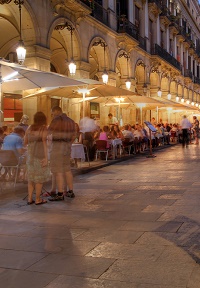Spain May Have to Reset Its Culinary Clock
The structure of daily life in Spain gets revamped — an example of European unification.
March 19, 2014

1. In Spain, the evening usually begins at 10 pm, the same time as people in quite a few countries are preparing for bed.
2. Dinner in Spain is often served at 10 pm and prime-time television shows start at the same time (and don’t end until after 1 a.m.).
3. Surveys show that nearly a quarter of Spain’s population is still watching television between midnight and 1 a.m.
4. To eat at another time and to sleep at another time than the rest of the world is seen as part of the Spanish identity.
5. At the same time, many urban Spaniards complain of a never-ending workday.
6. The Spanish workday begins in the morning and is interrupted by a traditional late-morning break – and is then interrupted again by the later midday lunch.
7. When workers in Spain return to their desks at 4 p.m. (with lunch starting at 2), they often work well into the evening.
8. The current pattern of working hours is not good for families, especially considering additional commute times to and from work.
9. A pro-efficiency movement contends that Spain can become more productive if more in sync with the rest of Europe in terms of its workday.
10. If Spain adopted a more standard work schedule, it would represent a fundamental change to Spanish life, closer to a 9-to-5 timetable.
11. Under a new schedule, the long midday siesta break for lunch and a nap would be truncated to an hour or less.
From Spain, Land of 10 P.M. Dinners, Asks if It’s Time to Reset the Clock by Jim Yardley (IHT NYT)
Takeaways
To eat and sleep at another time than the rest of the world is seen as part of the Spanish identity.
At the same time, many urban Spaniards complain of a never-ending workday.
Some contend that Spain can become more productive if more in sync with the rest of Europe in terms of its workday.
Author
The Globalist
Read previous

The Last Part of Sabria’s Journey
March 18, 2014